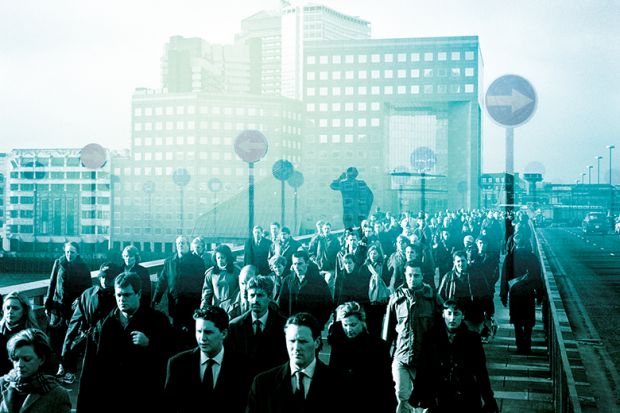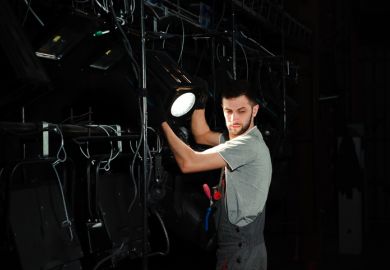Almost everyone agrees that the humanities are in trouble. What to do next is a more difficult question.
Some of the key debates focus on vocationalism, where views often come down to conflicting notions of the humanities and how those working in the field should relate to the world. If we are a part of the world, then vocationalism is fine, even inevitable; but if instead we see ourselves as standing apart, then vocationalism becomes a problem, threatening the very thing that makes the humanities special. Here I want to draw on my own experience to argue that now, more than ever, we need to resist this simplistic dichotomy.
A leading voice in the opposition to a more pragmatic version of the humanities is Anthony Kronman, former dean of Yale Law School. In The Assault on American Excellence (2019), he pillories vocationalism and the damage done to the higher ideals of the humanities in its name. Where we used to ask questions such as “What makes a whole life honourable and fulfilling?”, he argues, we now focus only on what students “need to learn to become a successful lawyer or computer scientist”. He likens the influence of the vocational ideal in the humanities to “corrosive acid”.
Kronman’s case is bombastic, but hardly a fringe position. In his critical review of the book, Michael S. Roth, president of Wesleyan University, disagrees with much of what Kronman has to say about the central and controversial issue of diversity. But on the negative consequences of the pragmatic turn in the humanities, they agree. “Vocationalism and the tendency to cater to students as consumers”, Roth writes, “are much greater threats [to academic excellence] than political correctness.”
Roth and Kronman agree on this issue because there is good reason for concern. Consider the rise of the “anti-college”, recently flagged up in The New York Times. These various educational initiatives, such as Outer Coast, the Arete Project and Wayfinding Academy, advertise themselves as places where students can “ask, and answer, the serious questions about life’s ultimate purpose”. That used to be what we did in the humanities, but perhaps not any more, and the article, not surprisingly, pins the blame in large part on the increasing “emphasis on practical skills” on college campuses. These programmes represent the front line in the growing “revolt against the treatment of students as future wage-earners”. Desperate for a good humanities education, some students are evidently finding it necessary to leave traditional universities behind altogether.
Such criticism of vocationalism in the humanities works best within a larger belief that the humanities are an island unto themselves. They exist above the mundane realities of our existence – and nothing represents that fallen world more than the pursuit of a job. Kronman, for instance, idealises humanists as a benevolent “aristocracy”, full of “genuine nobility in the matters of spirit”. And he is not alone. In a recent article, “There is no case for the humanities”, Justin Stover, a former fellow at the University of Oxford’s All Souls College, talks about humanists as a “tribe” or a “particular class” that unites around “a constellation of interests, tastes, and prejudices”. That we tend to have similar political beliefs is not our primary purpose, as conservative critics often allege, just a natural consequence of our shared beliefs and status. In the humanities, Stover writes, we sit “above the categories of nation, vocation, and time – we are a class constrained by no such boundaries”. To think seriously about vocational matters or spend our time concocting pragmatic justifications for the humanities is to welcome the barbarians at the gate and diminish ourselves in the process.
This posture effectively, and conveniently, puts the humanities beyond reproach from anybody outside our own ranks. We can strive to matter in the world, but if we fail, we can take a measure of satisfaction in that as well. Jason Steinhauer, academic dean in the arts and sciences at Villanova University, made a spirited case recently in an article for CNN that academic historians have not abandoned the public sphere, despite many opinions to the contrary. We are as “publicly engaged” as ever. We are on TV shows, we post on blogs and many of us even have Twitter accounts. But, as he reminds us, that is not the final metric: history PhDs are now analysing the past “through the frameworks of race, class, gender, labor, sexuality, identity, and disability and by studying the experiences of refugees, immigrants, women, children, and marginalized populations”. We are not doing this, in the end, “because it is the popular thing to do but because it is the ethical thing to do”. An existential threat to the humanities does not necessarily mean an existential crisis for its professors; in many cases, quite the opposite. It can easily operate as just more evidence that we exist on a higher plane than the rest of the world.
Any move towards vocationalism is doubly suspect, then. It corrupts what we do, potentially, at the same time as it threatens this foolproof posture. If we are open and sincere about worldly pursuits such as helping students get jobs, then the world may have something to say about how well we are doing it. Yet appeals for a more vocational emphasis are often hard for professors to ignore, especially the further you go down the academic hierarchy and the more you begin to work with less financially secure students. Many of my students work outside college and are anxious to graduate as quickly as possible, fully aware that their debt rises by the day. If graduation comes and goes and their job prospects have not improved, they will undoubtedly be disappointed. They are not against tackling life’s big questions, far from it, but they simply cannot afford to prioritise classes (much less a major) that pride themselves on having zero practical benefits.

So what might vocationalism in the humanities look like today? One possible answer is provided by Robert Hellyer, a professor at Wake Forest University in North Carolina, writing in The History Teacher journal. Concerned about the misperception that the humanities do very little to prepare students for professional success, he set out to make clearer the “skill acquisition” that was happening in his classes. He outlined these changes in his essay, “Marrying content and practice: raising undergraduate awareness of ‘job skill’ acquisition in a history survey”.
To start with, Hellyer, along with his school’s office of personal and career development, identified the ability to collaborate and communicate effectively as two areas prized by potential employers, which he then integrated into his curriculum, both in the subject matter and in the nature of class assignments. A former history major who worked in the healthcare industry was also an important participant in the class, talking with students about how to connect what they were doing to the challenges of the workplace. As a result, Hellyer reports, students began to articulate “learning outcomes about not only modern Japanese history [the topic of the class], but also about the practices of leadership and collaboration”.
At what point, though, it seems reasonable to ask, does a history class with practical benefits become a business class with some Japanese history on the side? Hellyer himself admits to a balancing act, pushing the leadership side of the equation so far that it sometimes came at the “expense of exploring aspects of Japanese history”. He obviously thinks this was a price worth paying; Kronman and many others would disagree.
Yet is this trap unavoidable? Does an emphasis on the practical benefits of our classes have to work against our other educational goals? The changing economy is giving us every indication that it does not. Developments in my own classes suggest that we have new and better options.
When I started teaching college-level history six years ago, I did so as a transient adjunct professor. Like many others, I knew I had no real chance of landing a permanent job, and I was honest with my students about this. They, in turn, frequently marvelled at my vocational blunder. Seven years of studying history for nothing, they observed.
Yet I was not complaining, and this rarely failed to bemuse them. I simply could not turn on my time in the humanities, since it had, just as Kronman and others assert it should, transcended mere vocationalism for me. When pressed by students for details, I stumbled in my response at first, eventually landing on something approximating to the idea of ambiguity. In short, I would tell them, I was now more comfortable thinking about the world as a complicated place, and I valued that perspective so much that I could never fully rue my time in the humanities, even on my slow march to the unemployment line.
I began to reorganise my classes accordingly. My new priority was to teach my classes with an overriding emphasis on ambiguity. I would not construct grand narratives in my introductory courses but would instead find instances of maximum ambiguity and ask my students to focus on that instead. My task, as I began to understand it, was to inform and befuddle, and it had nothing to do, in my mind at that time, with helping anyone find a job (something my students would hardly have considered me an authority in anyway).
But as I altered my approach, I could hardly fail to realise how my classes, at the same time, were becoming more relevant to the everyday life of my students in myriad different ways, including, and perhaps especially, their job prospects. A recent article in The Atlantic, for instance, presented a cutting-edge naval ship, the USS Gabrielle Giffords, and its use of something called “minimal manning” as the “future of work”. On this ship, specialised skills are a thing of the past. Given the pace of technological advance, the “half-life of skills” is too short. In place of trained experts with “crystallised” skill sets, the ship is now full of “problem-solving generalists”. The sailors go from lookouts to line-handlers to cooks in the course of a normal day’s work.
These circumstances, the article explains, require “different acquired skills” and “inherent abilities”. In the field, where things are “fluid and full of surprises”, the navy has begun to realise that grit and expertise are not the best indicator of success. What is needed is something called “psychological hardiness”, defined as a willingness to “explore multiple possible response alternatives, a tendency to see all experience as interesting and meaningful, and a strong sense of self-confidence”. The dominant conception of “what makes a good worker” is in flux, the article concludes. The jobs of the future (and increasingly the present) are going to prioritise “things like ability to learn quickly from mistakes, use of trial and error, and comfort with ambiguity [my italics]”.
If these are the skills that the economy is going to need, how can a good humanities class not also be about “job skills”? To be vocationally irrelevant right now seems all but impossible. Stover argues that the humanities can never be about this type of skill development: “no one wants to learn Sanskrit because it will give them a leg-up in a fast-moving economy...it will never be a compelling case for the Humanities that they are a gym for the mind.” I am not so sure about that – and many non-academics, at least, are starting to say as much.
But academia is made up of wildly different institutions, so there is room for different approaches. Surely, it makes sense to teach the humanities one way at Yale and Oxford and a different way at a community college or a technical institution. And, hopefully, these divergent efforts can be understood as compatible and even complementary, with vocationalism, in many instances, cracking the door open just a little for students who were never going to see what we have to offer otherwise.
If not, and vocationalism continues to be seen predominantly as a threat to the humanities, then the practical effect will be to continue to welcome certain students but not others. The first to disqualify themselves will be students under intense pressure to get a job. As concerns rise that colleges are far better at reinforcing social hierarchies than encouraging social mobility, a broad indictment of vocationalism in the humanities will put us on the wrong side of those concerns, creating an “aristocracy”, to be sure, but not the kind that society at large has any interest in reconstituting and supporting.
Stover ends his article with a call to humanities professors to stop worrying about justifying our existence and to return, with a laser-like focus, to our craft and our scholarship. We need to “put our hand to the plough” and get back to work. A wonderful metaphor, to be sure, but what if others, outside the humanities, think that advice applies to them as well? They would have many more important things to do than take a humanities course. And, in that scenario, who loses more – us or them? At this point, there is little need to choose. It’s both.
Kevin Vanzant is a history instructor at Tennessee State University.
POSTSCRIPT:
Print headline: Embrace the ambiguity
Register to continue
Why register?
- Registration is free and only takes a moment
- Once registered, you can read 3 articles a month
- Sign up for our newsletter
Subscribe
Or subscribe for unlimited access to:
- Unlimited access to news, views, insights & reviews
- Digital editions
- Digital access to THE’s university and college rankings analysis
Already registered or a current subscriber?







